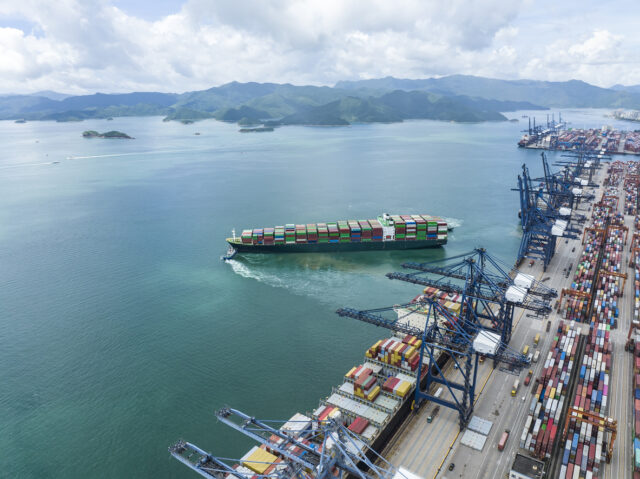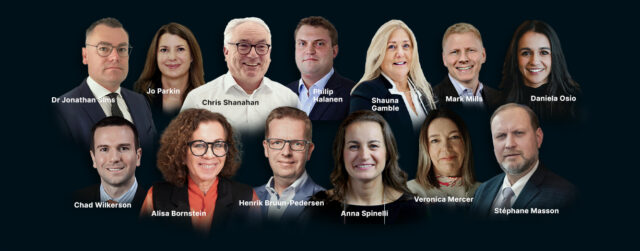How important is it to celebrate successes even during times of challenge?
Ian Thompson:
With the passage of some time, what will be some of the positive impacts from this? I think that’s a good mental exercise for all of us. It is a tough time, and I wonder if people will now understand the supply is an ecosystem. When we’re doing business, it’s not just oh they’re a small supplier so we can treat them in the transactional manner. We can try and squeeze their margin, but actually we might remember the time when we realized they were a key part of an ecosystem that actually delivers for our society. Seeing things in a more holistic way.
People will understand that sometimes innovation isn’t just an option. It’s something that is essential and there’s been times, Plato said it thousands of years ago, that necessity is the mother of invention, and we’ve really lived that. We’ve really seen it through. Looking at the importance of our profession and what we do, it’s now a family conversation about how we’re managing to use different processes or websites and when that’s going to be delivered. So both the activity of us buying what we need and the heroes that are working in the distribution centers, who are driving the vans. Procurement and supply chain has become a family conversation.
Iain Campbell McKenna:
The crisis has really enabled us to highlight what we are doing, why are we doing it, and are we doing it well? Looking at improving our supplier relationships and I think moving away from email and spreadsheets, these are inherently flawed. I don’t think in this crisis we really need the new rule book. We just need to form a commitment to actually act on the ones that we’ve been doing and have more meaningful practice and focusing on what we can do right, and what can we improve. This has really enabled procurement leaders to take a step back and think; how is my procurement function formed? What can we do to improve it? I think it’s given people the breathing space that they needed to have insightful conversations internally to improve things that might not necessarily work.
With the notion of a ‘new norm’, can procurement ever go back to what it was pre pandemic?
Jon Hansen:
Through time, there’s always progressions of change. Some have obviously not been as traumatic and dramatic as COVID-19. The world is progressively changing. If you look back, and stop moving forward and stop learning, I think that’s where it ends. So what COVID has done for us is not so much a return to the way things were, but an embracing of the way things could be.
We’ve certainly shown that we can operate on a remote basis through many of the things we’ve talked about. The reality is, the technology is there to work remotely. The efficiency of working remotely is that productivity is on the rise. We’re creating new cost models and new efficiencies of doing business and that is just a normal part of the progress.
There are markers in time that move us forward and build on what we’ve learned and this is a more dramatic one.
What will be the ‘new norm’ for the CPO?
Iain Campbell McKenna:
When organizations are searching for a CPO or a procurement director, they do very much have an onus on strategy and implementing technology and facilitating technology at their disposal. I think what COVID-19 has taught us is having a high level of EQ for our leaders is imperative. Because being able to have empathy, to be able to self regulate, to build relationships, and build relationships not only on a face-to-face basis, but remotely is something that I hope that we’ll see a shift on and companies will really see the value in having a leader who’s got a high EQ. At the end of the day, you can learn how to implement a process, you can learn how to use technology, but it’s very difficult for a leader to learn how to be emotionally intelligent. Because for many, it comes very natural and others it doesn’t, and it’s not the norm.
What about the vendor perspective? How has the procurement vendor’s ideas and practices changed?
Ian Thompson:
I think the emphasis and prioritization of technology will continue and perhaps be stronger. There might also be a clearer understanding of priorities of what matters. What is the enterprise trying to implement? What is it they’re trying to do? What outcome do they need? Technology is the facilitator of that, and I think those ideas may have been crystallized for a lot of businesses.
I also think we’ll see more steering away from transactional and looking at supplier innovation. There’ll be companies that are cash stressed who are going to be driving their procurement departments back to cost and transaction, transaction cost and margin squeezing. There’ll be other companies who will see this as a moment to really drive forward on that value and innovation piece, and looking at the supply chain and the supply base as an ecosystem.
Will Covid19 define the future of procurement?
Jon Hansen:
The extent of impact of the supply chains, and its impact on the economy is so critical. If you think about the overemphasis on low cost country sourcing and concentrating the supply power into one or two countries, that creates challenges in of itself. I remember reading a New York Times article not that long ago where they said, when SARS hit, China was really relied upon for that country for T-shirts and sneakers. Now of course, when COVID hit, we are so reliant on them for everything.
When you look at the permeation of procurement in our lives, we realize now that beyond the supply chain, we are now dealing with the economies of the world and the stability of these economies. This is a warning light for that, but it is also laying the groundwork for what I believe the true battles of the future will be. Supply is going to become even more important in such a world where trade is increased, where supply chains are extended, and when those supply chains are interrupted, lives are permanently affected and altered. It’s created a watermark awareness of the nature and depth of how supply chains influence beyond what we, even in our profession, understand and know to get into areas of economic growth and prosperity.
What advice would you give to procurement professionals to try and succeed in a constantly evolving landscape?
Ian Thompson:
There are some principles that I work by all the time which were taught to me by my first boss; assistance, politeness, preparedness and positivity. Simple mantras which don’t solve your problem day to day, but if you try to live by them in business, you do suddenly realize that you’re having a degree of success.
Living in challenging times, you are, at the end of the day, living a dramatically different lifestyle. That’s a challenge. It’s about making sure I’m talking to my team every day, showing them concern and compassion. It’s easy to be cliché, but I think those things are genuinely important and will lead to successful navigation of this period.
You can look at it with a business brain and try to wargame the situation and what’s going to happen, but it’s so important to also remember that this is impacting real people in terrible ways and maintaining that awareness is super important.
Iain Campbell McKenna:
It really has given people a chance to reflect and I have seen a real shift in people’s willingness to have an open conversation and I’ve definitely seen a nice side of humanity that have open and enjoyable conversations with procurement leaders whose previous mindsets in procurement were very different. I do see quite a shift in people’s way of engaging with me and I’ve got a team that works for me and I’ve had to obviously show a different side of me that I do try to show on a day to day basis. I’ve really opened up more and we have more of a deeper relationship, and I’ve been able to shift my management style to become more empathetic.
Jon Hansen:
One of the things in a crisis that’s important is not to look for consensus, but to create a respectful dialogue that challenges the status quo thinking. That respectfully understands the other party’s point of view without making it something that is personal. What this crisis has shown us is our better angels and our worst angels. I think what we have to focus on is the fact that there are checks and balances. I think what we need to do is adopt that through all avenues of life, not just in this crisis, but in the way we work. That we shouldn’t strive for consensus or to win an argument or get people over to our side. I would rather focus on getting it right, than being right. I think this whole thing has created a sense of humility and humbleness and realizing that we don’t have all the answers, but we do have the tools if we are very much willing to collaborate and work together towards a mutually beneficial outcome. This has become very crucial in the procurement buyer and supplier relationships.
It begins internally and extends to external partners. If we take that approach, then we will find the answers. We will find the right path to go. We won’t always get it right and that’s why many senior executives, especially on the high tech side, say if you’re going to fail, fail fast, but don’t be afraid of failure. Move in that progressive direction. That’s what I’m taking away from this overall experience. Better communication, collaboration, meaningful discussion and debate, versus forced consensus.











